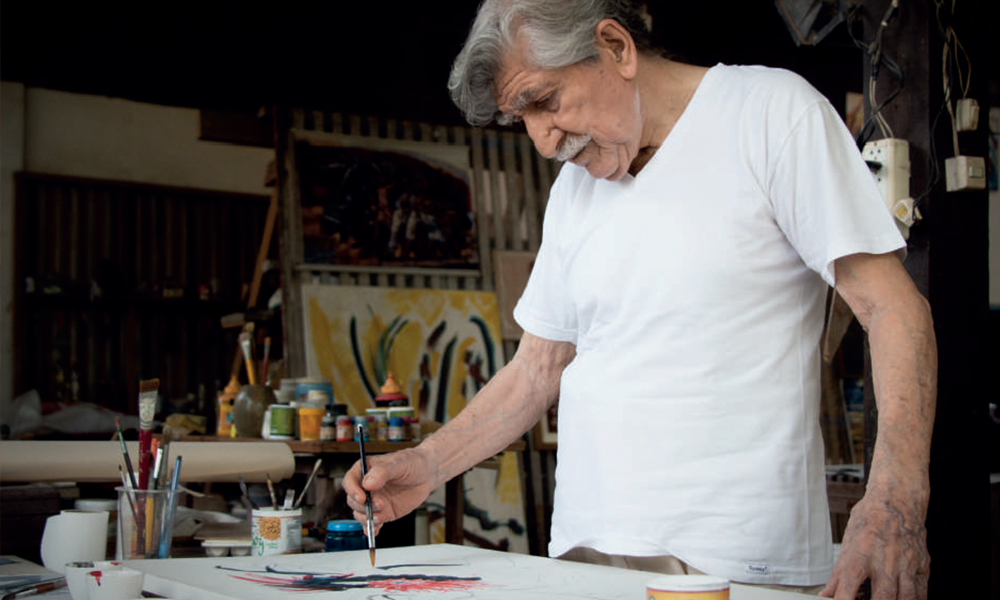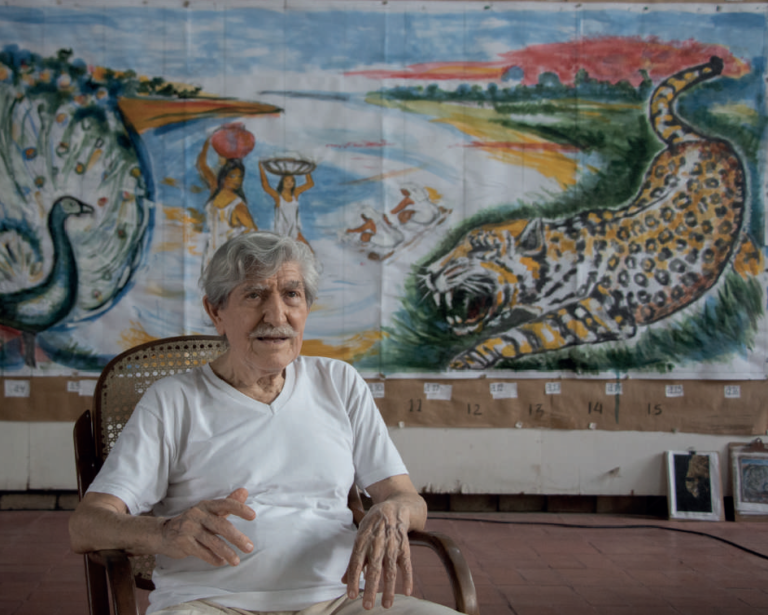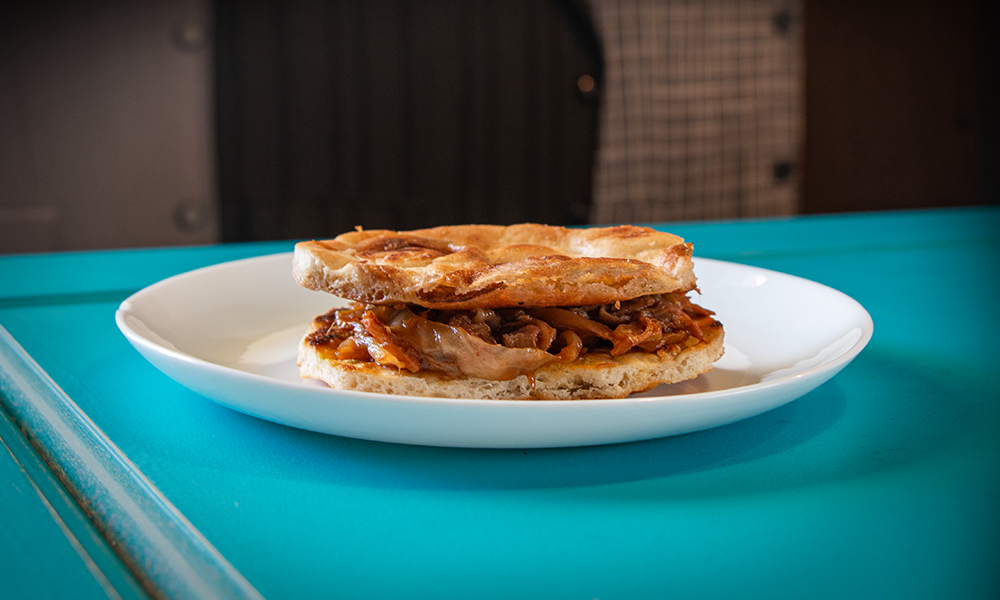
“Porque toda la historia que el artista cuenta, es una historia que ha vivido él con su pueblo, con los demás. Y el que la recibe, recibe esta comunicación pero al mismo tiempo pone lo suyo. El espectador de un mural es un coautor de la obra, es una persona que después va a hablar de esta obra y seguramente va a descubrir bondades o defectos o cosas no vistas, nos va a dar una nueva mirada, sobre la vida, porque todo lo que hacemos y todo lo que decimos es una metáfora.” Lorgio Vaca
En el vibrante mundo del arte boliviano y latinoamericano, el nombre de Lorgio Vaca resuena con una magnificencia que trasciende fronteras y tiempos. Nacido el 24 de septiembre de 1930 en Bolivia, este polifacético artista se erige como un verdadero maestro en diversas disciplinas: escultor, ceramista, muralista y pintor. Su legado artístico se extiende por décadas, y su contribución a la cultura boliviana y latinoamericana es incuestionable. Lorgio Vaca, ha plasmado su visión única y su profundo entendimiento de la vida y la naturaleza en obras monumentales que adornan las ciudades y paisajes de Bolivia. En esta entrevista exclusiva, descubriremos los misterios detrás de sus murales gigantescos, y su eterno diálogo con la pintura y la arcilla.
¿Podría considerar alguna etapa de su trayectoria, más especial o trascendental?
Bueno yo te podría decir que la obra mía es como un hilo, que se va desenvolviendo desde mis cuatro años hasta ahora, este hilo que yo he ido siguiendo aconsejado por mi sentimiento, por este amor por la vida que tengo. Por causas de la vida yo quedé sin padre a los seis años, mi padre fue a la guerra del chaco cuando volvió mis padres se separaron. Papá se fue de la casa pero antes de irse me regaló sus acuarelas y me dijo: “te dejo esto para vos, para que sigas pintando” porque ya yo había pintado el piso todas partes. Yo recibí esa acuarela y mi padre se desapareció hasta que yo tuve 12 años, entonces yo pintaba secretamente, sin necesidad de tener que mostrarla a nadie, sin que tuviera que gustarle a nadie sino a mí mismo. Hasta que un profesor de artes en el colegio me exigió que presente 2 trabajos para salvar el año, corrí a casa, saqué 2 acuarelas, las entregué y me escondí en el baño, cuando volví a la clase, estaban mis acuarelitas en la pizarra y mi profesor elogiando mi arte.
Pero siempre conservé hasta ahora esa libertad de hacer algo para que me guste, por eso cuando escojo una historia, es lo que me parece, no me gusta que me impongan.
¿Qué mensaje transmite con su obra a las actuales y futuras generaciones?
Yo creo que dentro de esa pregunta se expresa un sentimiento muy humano, que es dejar a los que vienen detrás nuestro ¿Cómo hemos vivido nuestra experiencia?. Cada uno de nosotros es un mundo diferente, cada uno de nosotros es algo nuevo que ha habido, por eso es que la creación no se da aislada, la creación se da siempre por el intercambio, por el choque, por la acción conjunta maravillosa, no esperada, a veces de los contrarios.
Lorgio Vaca recibió este 21 de septiembre, la condecoración nacional de la “Orden del Cóndor de los Andes” que es la más alta distinción que otorga el Estado Plurinacional de Bolivia a ciudadanos e instituciones nacionales o extranjeros, por eminentes servicios, civiles o militares, prestados a la nación y a la humanidad.
Lorgio Vaca – Exclusive interview
“Because the entire story that the artist tells is a chain of events that he has lived with his people, with al lof them. And the ones who receive it, embrace this communication but at the same time contributes with their own words. The viewers of a mural are a co-author of the work, they are a who will l talk about this work and will surely discover benefits or defects or things that had not been seen before, they will give us a new point of view about life, because everything we do and everything, we say is a metaphor.” Lorgio Vaca.
I n the vibrant world of Bolivian and Latin American art, the name of Lorgio Vaca resonates with magnificence that transcends borders and time. Born on September 24, 1930 in Bolivia, this multifaceted artist stands as a true master in various disciplines: sculptor, ceramist, muralist and painter. His artistic legacy spans decades, and his contribution to Bolivian and Latin American culture is unquestionable.
Lorgio Vaca has captured his unique vision and deep understanding of life and nature in monumental works that adorn the cities and landscapes of Bolivia. In this exclusive interview, we will discover the mysteries behind his gigantic murals, and his eternal dialogue with paint and clay.
Could you consider any stage in your career that is more special or transcendental?
Well, I could tell you that my work is like a thread, which has been developing since I was four years old until now, this thread that I have been following guided by my feelings, by this love for life in my heart. Due to different situations in life, I was left without a father at the age of six. My father went to the Chaco War. When he returned, my parents separated. Dad left the house but before leaving he gave me his watercolors and told me: “I’ll leave this for you, so you can continue painting” because I had already painted the floor everywhere. I received those watercolors and my father disappeared until I was 12 years old, so I painted secretly, without the need to show it to anyone, without anyone having to like it but myself. Until an arts teacher at school asked me to present 2 projects to save the year, I ran home, took out 2 watercolors, handed them in and hid in the bathroom, when I returned to class, my watercolors were on the blackboard and my teacher was praising my art. But until now I always retained that freedom of doing something because I like it, that’s why when I choose a story, it is what I think it should be, I don’t like to be imposed on.
What message does his work convey to current and future generations?
I believe that within that question a very human feeling is expressed, what is that you leave to those who come behind us. How have we lived our experience? Each one of us is a different world, each one of us is something new that has existed, that is why creation does not occur in isolation, creation always occurs through exchange, through collision, through wonderful joint action, unexpected, sometimes from the opposite.
This September 21st, Lorgio Vaca received the national award of the “Orden del Cóndor de los Andes”, which is the highest distinction granted by the Plurinational State of Bolivia to national or foreign citizens and institutions, for eminent services, civil or military, to the nation and humanity.
Las fotografías son de uso exclusivo para la revista Bolivia in.




